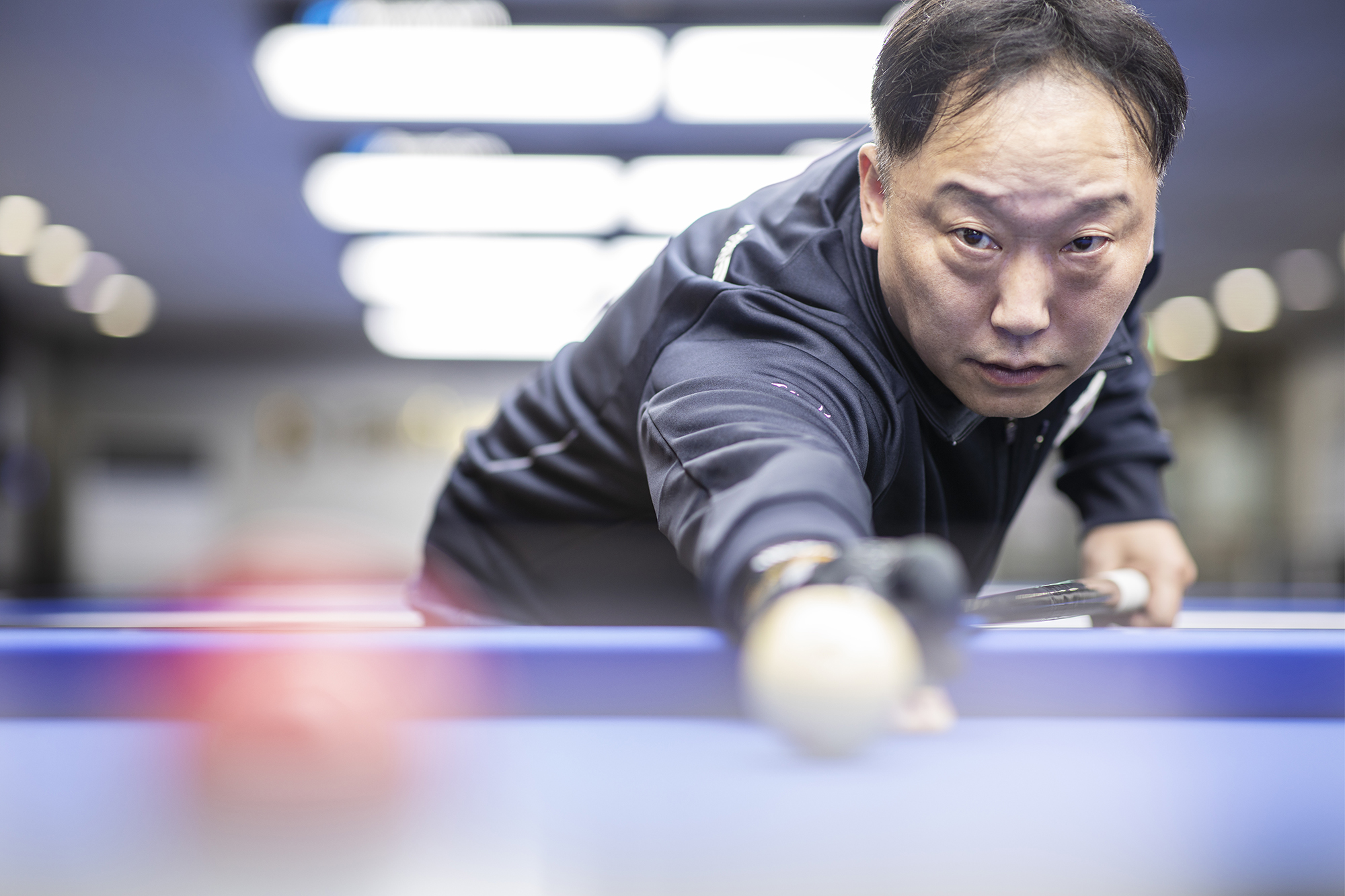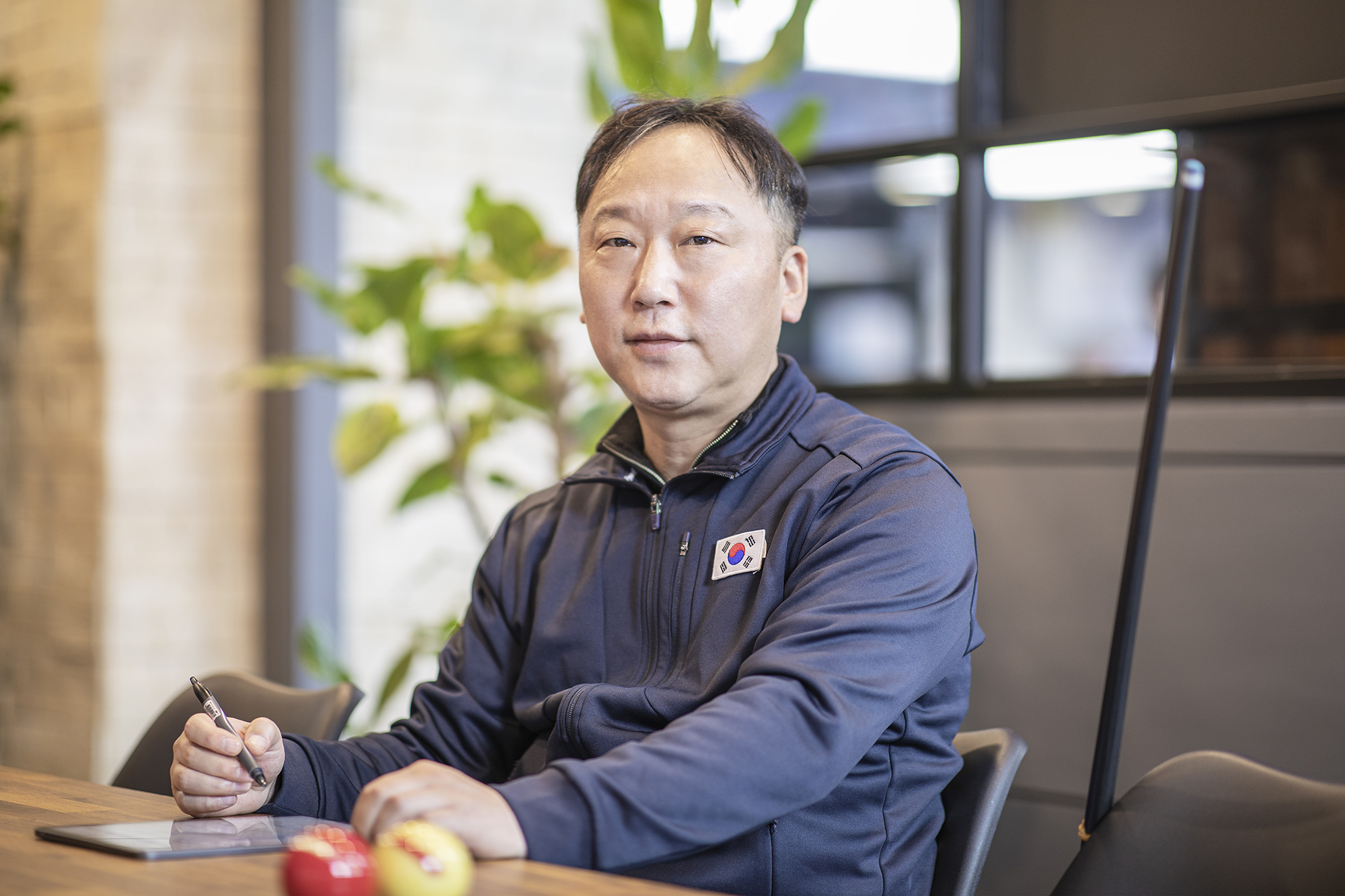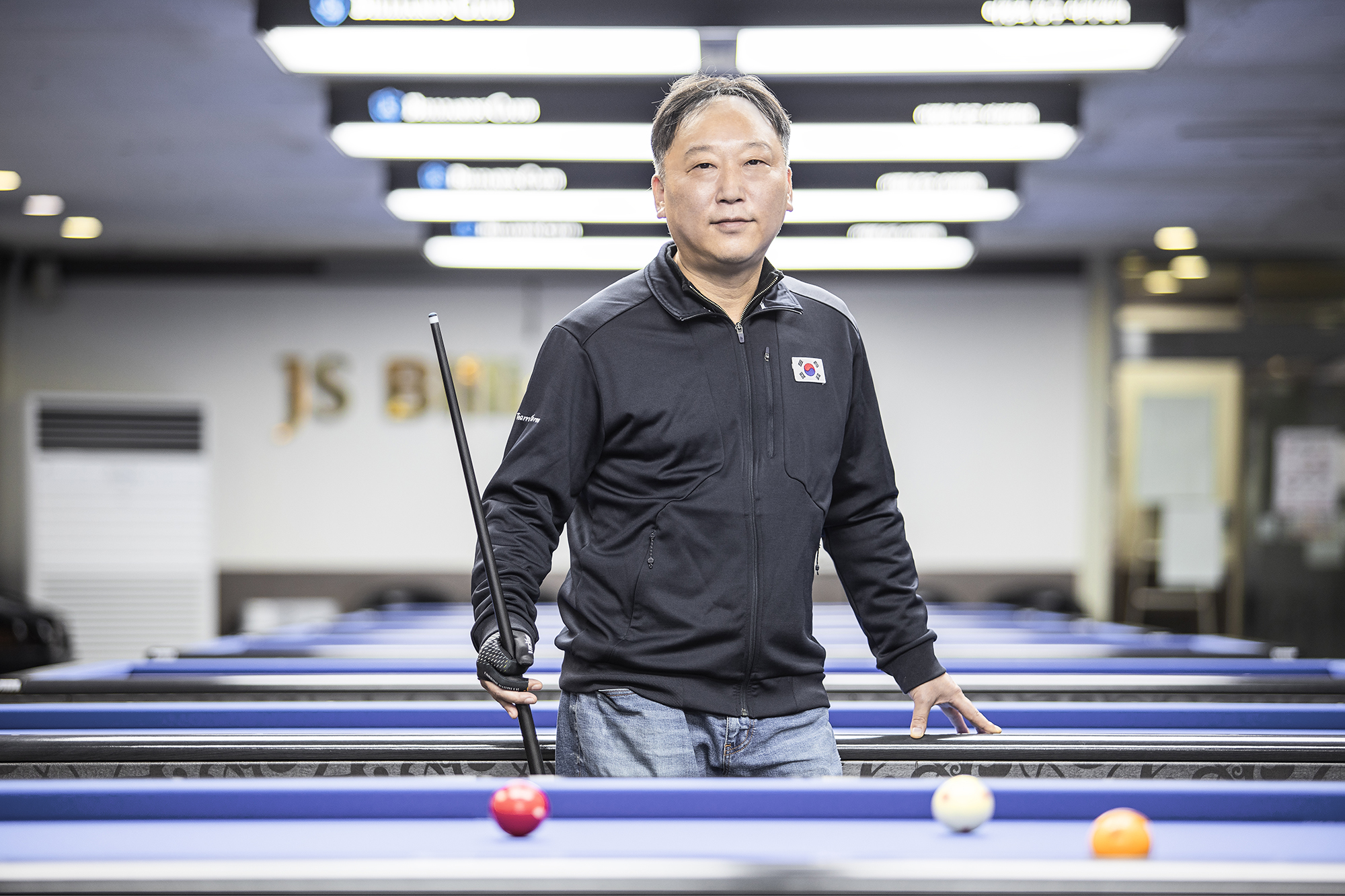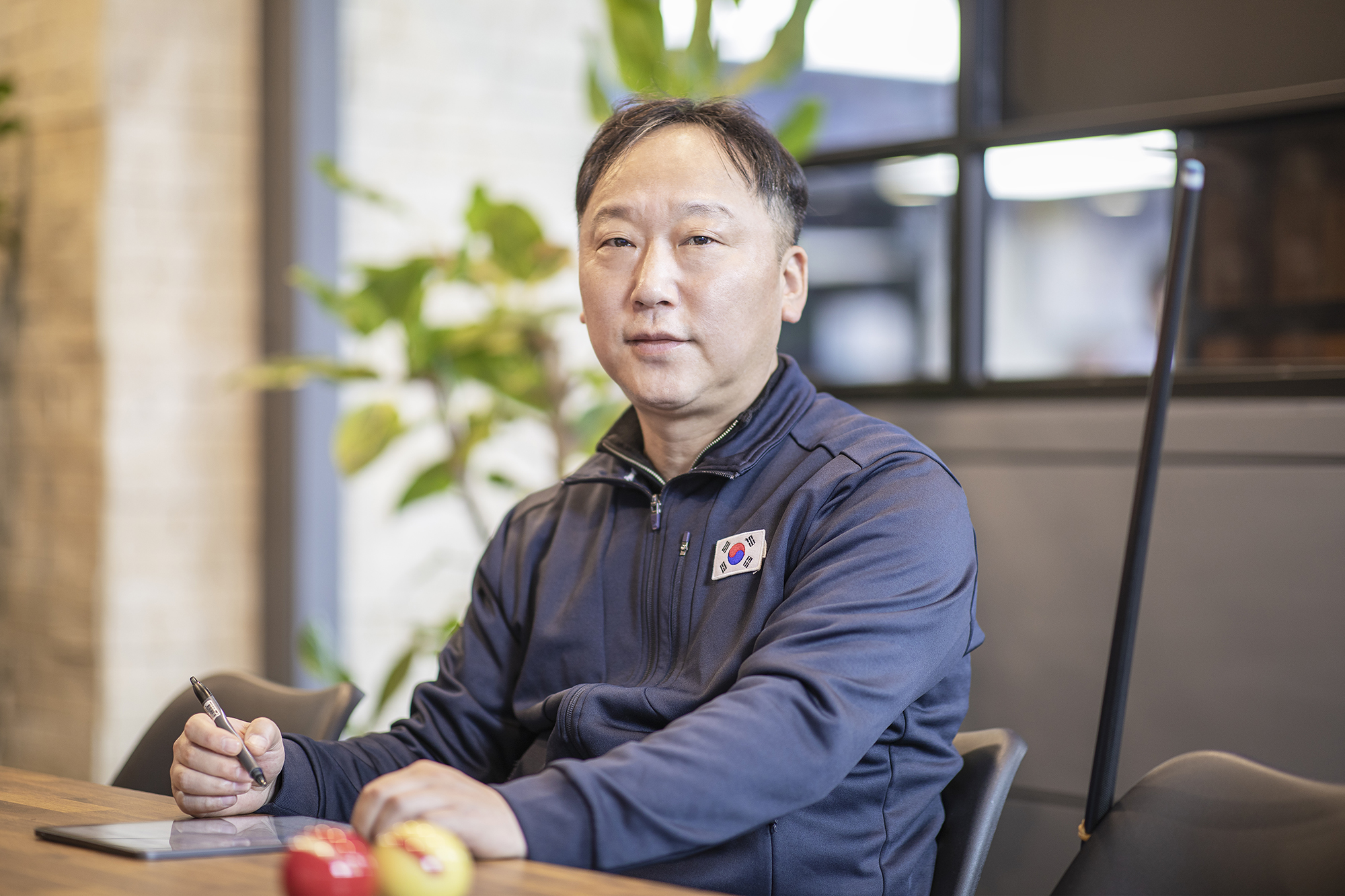- Throwing a Winning Shot at Passion June 02, 2021
-
Lee Jang-hee (Mathematics, Entering Class of '87), the Pioneer of Billiards in South Korea

Immersed for Billiards
Billiards is a sport of immersion. On a rectangular billiard table lies several "paths" available that determine the outcome of a game. It is up to the players to predict the most efficient moves towards victory. Players predict the angles and ways the ball would go and choose the most effective way to win the game. This process is imaged in their brains as it is, so it requires high concentration and immersion. Choice and immersion. These resemble the life of Yonsei alumnus Lee Jang-hee, the life of someone who has devoted himself only to billiards, as a college student who was fallen in love with billiards and became a talented billiards player, an administrator, and a coach who draws a big picture of the development of billiards in Korea. In that way, Lee Jang-hee made a path of passion that he pioneered by himself and threw his own winning shot at that path.
Billiards: The Life-Changer
Although there was no double major system back in his days in the late 1980s, Lee Jang-hee has two bachelor's degrees from Yonsei University: diplomas from the Department of Mathematics and the Department of Physical Education. Only after Lee completed his university entrance examination did he fall in love with billiards. Like first picked up the interest as he coincidently visited a billiards center owned by his friend's father, and it progressed into a strong passion upon entering the university. A student majoring in mathematics who practically resided in billiards centers, Lee barely earned his qualification for graduation from the mathematics major. But his love for billiards and firm determination to be a professional player in the field eventually led him to enroll in Yonsei once again as a student majoring in physical education.
"I loved sports since young. I usually enjoyed baseball and basketball. The desire to pursue a degree in sports had been on my mind since high school, but it was met with conflicting wishes from strict parents. However, my passion for sports still remained strong to the extent that I immediately joined a baseball club, the "Yonsei Eagles," upon enrollment. As I officially realized the charm of billiards in the early stages of my student days, I obviously did not pay much attention to my major. In fact, it took me 11 semesters to attain a degree in mathematics. There was even an occasion when I took a semester off to hone my skills for the national billiards tournament for university students; I really wanted to win the tournament as soon as I first saw the advertisement. I initially visited the College of Educational Sciences to request a switch to a physical education major. Still, it was impossible as there were no similar precedent cases for reference. There was no hesitation in re-entering the university to study the physical education major. I was determined to pursue the path of a professional athlete, and it was a decision purely out of my own will."
His passion for billiards reached its peak in 1993 as he participated in the national billiards tournament for university students. As a participant among 130 who even took a semester off to hone his skills, Lee eventually clinched the champion trophy. He constantly strived to improve his skills by searching for players from whom he could seek guidance. Even though he was still an undergraduate, he gradually gained the confidence to pursue a career with billiards. Nonetheless, there were still obstacles to overcome.
"There was strong disapproval from home. My father was a self-made elite. And as I was the first son of the family, there were definitely difficulties getting consent to become a professional billiards player, especially after enrolling in a prestigious university. Eventually, I had to leave home, living alone for nearly five years, to pursue my dream. But these five years were also a crucial period of my life as I managed to grow the conviction strong enough to make the life-changing choice."
After years of preparation and practice, he was officially registered as a professional athlete under the Seoul Billiards Federation (SBF) in 1999. His reputation took a steady climb, as he attained a joint third position in the 2003 National Billiards Tournament and seventh place at domestic rank. His success was not an end-point of a straight, smooth-sailing path, but he eventually found the answer by following his passion. Like how a point is scored in billiards, the cue ball caromed off both object balls after contacting the rail cushions three times.
Overcoming Billiards' Limitations as a Sport
Life as an athlete was a joy, yet that did not mean that Lee disregarded the limitations of billiards as a professional sport in South Korea. Billiards was not viewed as a commercial sport, and financial circumstances were limited for professional players to make a living. Realizing the field's current status, he decided to take the initiative to assume a role that could paint a bigger picture for the sport.
"I've worked hard as an athlete, yet the environment of the field itself was way too poor. Then, I set a new goal to raise awareness of billiards as a friendly sport for all to enlarge the "pie." There was a need to establish an administrative system to bring transitions to the industry's fundamentals and bring progress."
Such a goal has led him to assume various roles, such as the public relations director and executive director of the SBF, as well as the director of the Korea Billiards Federation (KBF), as he took charge of establishing and facilitating the sport management system in the industry. His dedication managed to grow the federations to official organizations with authority while making billiards recognized as an official sport in Korea. These were accomplishments that were not feasible without his commitment and dedication in the field.
Being the first "billiards professor" in the field after completing his master's and Ph.D. in Yonsei, Lee had opened several sports elective modules from 2008 to 2016 where students could be introduced to billiards and its charm. Though he had been in charge of sports electives for table tennis and softball since 2003, it was only in 2008 when he was granted the opportunity to officially teach billiards at university. It was met with massive interest among the Yonsei students with overwhelming applications. His path as an educator continued in 2012 as he taught billiards at the School of Sports at Soongsil University, where he first laid the foundations for establishing a "direct school admission for billiards."
"During then, virtually no one thought to "teach" billiards. It was common among many billiards professionals to not have a degree, let alone a degree in physical education," recalled Lee. "Such atmosphere made me determined to pursue a Ph.D. who could take the lead in opening billiards-related modules and even departments with direct school admission policy for billiards. There was vast progress, and now we can see many youths training to be professionals from a young, with support from educational institutions such as Soongsil University and Korea National Sport University making admission openings via direct school admission. There is a tremendous sense of accomplishment to see such a development in the field."
Life as a Coach and the Best Moment of Life
Lee's career in billiards took another turn as billiards was selected as one of the official sports contested in the National Sports Festival. He gave up his previous roles in billiards federations and embarked on a new journey as a coach. Being the first billiards professional who attained a first-class coach license from the Korea Institute of Sport Science, he managed to win the opportunity to take leadership as a national coach of the 2013 Incheon Indoor Asian Games. His performance as a coach reached its peak as he assumed his role as South Korea's national team's head coach from 2018 to 2020, proving his capacity not just as a player but as a coach as well.
"I guess the highlight of my billiards career is definitely the moment when the South Korean national team that I took charge of entered as the champions for two consecutive times in the 2018 World Team 3-Cushion Championship in Germany," stated Lee. "The national team managed to win all the matches from preliminary rounds to the finals, and South Korea was ranked the first in the world billiards ranking that year. As a coach, leading the team in the most prestigious international competition gave me a chance to gain precious experiences and lessons. These achievements also led me to receive an excellent coach award from the Korean Sport and Olympic Committee, so it is definitely the happiest memory in my career."
It should be noted that the role of a head coach at a national billiards team is slightly distinguished from that of other sports. With athletes from the national squad occupied with approximately ten world tours a year, there are difficulties to have prolonged training sessions together before world championships. Even when participating in team matches, it is only two to three days before an actual competition when athletes can concentrate on preparing together. With confidence in the technical excellence of individual athletes, Lee would place greater emphasis on stabilizing their state of mind and ensuring their best physical conditions. He believes that the secretes to winning do not lie in controlling the players but in formulating strategies and easing their tension.
His philosophy and capacity as a coach were proven once again at the 2019 World Junior 3-Cushion Championships in Valencia, Spain, as the national youth team dominated all first, second, and third places in the event. With most professional national team players being winners of junior category competitions, he found this experience exceptionally meaningful as he could "discover and guide future national team players." As the significance of systematic training and education for youth players has been emphasized over the years, he continues to contemplate solutions as a mentor in the field.
Unquenchable Passion
He has been coaching many of the best players in Korea as well as the national team and currently runs the JS Billiards Club and an academy under his name to teach billiards. People of all ages, be it billiards enthusiasts, amateur players, or female professional players, are visiting the club to seek his guidance. His billiards club has become a renowned hideout for billiards lovers who would gather to enjoy the sport.
"There are many people coming to me to request coaching. Nowadays, billiards has become a widely accessible sport with ample information and training centers available for the public. I was once a coach training the professionals like the national team, and I intend to continue being one when the opportunity comes. But with the rising number of enthusiasts in the field, I also intend to assume the role of an instructor to guide them as well."
Though living a busy life as a coach, Lee also enjoys billiards with his precious friends from time to time. He has been interacting with the Yonsei Billiards Club (YBC), the Yonsei alumni billiards club, to continue the relationship with fellow Yonseians.
"Before the COVID-19 outbreak, there were regular YBC sessions with several events. There were even Yon-Ko Games which we hosted for the third time, where 50 players from each university would participate in matches in teams. Yonsei is still leading with an outstanding record of two to one, and I look forward to the upcoming events that would resume after the pandemic."
Lee's adventure has not stopped as he embarked on a new journey as a commentator with the launch of the "PBA Tour" professional billiards league three years ago. He is taking new roles conscientiously as the field expands, and he is still looking at the next steps with passion.
"I feel that the perception of billiards as a sport has changed dramatically over the years. Billiards has emerged as a sport for elders because it stimulates brain activities without much physical strain. As the base of enjoying billiards has expanded, I believe that we should also actively engage in combining various things apart from the sport itself. In particular, I am interested in integrating technology in terms of kinetic mechanics. Programs analyzing body movements while calculating efficient movements would create more accessible mediums for the public, like screen golf. It has already been introduced and used in many other sports, and we might be slightly late, but I think it is a critical challenge for the spread of billiard sports." Hope You All Find Something to Die For
Hope You All Find Something to Die For
Lee Jang-hee has pioneered and developed the popularization of billiards as a sport in South Korea out of sheer passion and love for the field. His bold decisions at critical junctions of his life come from his conviction in doing what he is "willing to die for." And the accumulated experiences he gained through such a journey have made him into a renowned figure in the field as we know it today. Though it was not an easy journey, Lee finds it more satisfying as he recounts his past. He recommends his junior Yonseians try what they want to do with confidence.
"The current generation is smart; they can look for necessary information and easily access good routes to receive help. This means that if you decide to do what you like, there are ample opportunities to do it. Rather than giving them up at the expense of society's definition of success, please believe in your passion."
When asked whether he would make the same decision if he could go back to his twenty as a first-year student at Yonsei, Lee expressed confidence to state that he would choose to major in sports without hesitation regardless of his parents' disapproval. His passion for billiards is indeed an everlasting flame that can never be put out.
show mobile menu
mobile menu




